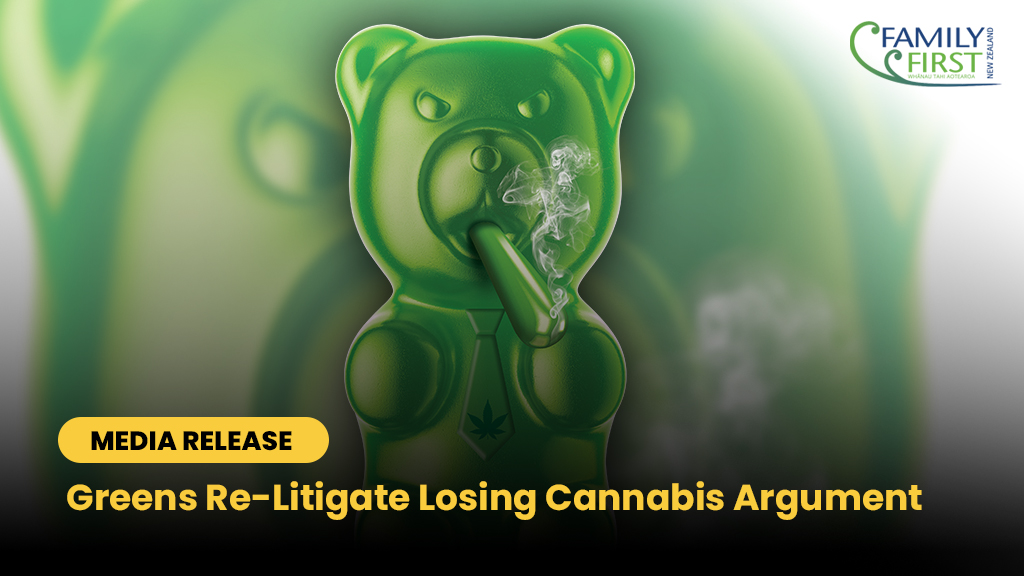
MEDIA RELEASE – 29 October 2025
Family First says that the Green Party’s attempt to relitigate the cannabis debate is desperate politicking that refuses to accept democracy and to divert attention from the proven harms of legalisation which have been mounting since 2020.
“Contrary to Chloe Swarbrick’s claims, the evidence coming from parts of the world that have legalised cannabis prove beyond doubt that New Zealand made the very best decision in 2020 when it rejected legalisation,” says Bob McCoskrie, CEO of Family First NZ.
“Swarbrick says that the referendum was an ‘unfortunate binary’. This is a complete myth – as is her assertions that people are being locked up for smoking a joint. The referendum involved a proposed law with details as to how so-called ‘regulation’ would look like. This is the real reason she lost the referendum, because voters saw just how harmful and extreme the legalisation of the drug would look like in their communities and within families.”
“When voters know exactly what legalisation of drugs look like, they rightly reject the proposal.”
The evidence continues to pour in about the harms of the drug to users and communities.
According to data obtained under the Official Information Act by Family First last year, New Zealand health authorities say that 461 patients have had a primary diagnosis of Mental and behavioural disorders due to use of cannabinoids, psychotic disorder in the last recorded 12-month period (22/23) – rising from 376 in 2019/20 – an increase of 23% over four years.
In a 2024 report in Australia, “doctors are warning of a significant increase of people ending up in hospital with psychosis after being prescribed the drug. Their concerns come amid a proliferation of “single-issue” cannabis clinics setting up in Australia, some of them willing to prescribe via telehealth consultations with few checks..”
Dr Marta Rychert, a senior researcher at Massey University who with co-author Associate Professor Chris Wilkins published NZ Medical Journal: Implementation of the Medicinal Cannabis Scheme in New Zealand: six emerging trends warn about the increasing prevalence of products high in THC.
A significant study released at the time of the referendum found that “people who smoked marijuana on a daily basis were three-times more likely to be diagnosed with psychosis compared with people who never used the drug. For those who used high-potency marijuana daily, the risk jumped to nearly five-times.” By “high-potency” the researchers meant marijuana with THC content of just 10%+. During the Referendum in 2020, Patrick Gower found growers who were manufacturing a concentrated cannabis resin (dab) with an incredibly potent 81 percent tetrahydrocannabinol (THC).
A study released in 2017 in the US and published in the journal JAMA Psychiatry found that marijuana use and marijuana use disorders – in which people use the drug in unhealthy or abusive ways – increased at a “significantly greater rate” in states with medical marijuana laws than in states without the laws.
In the US, the National Survey on Drug Use and Health (NSDUH) that assesses the prevalence of substance use and substance use disorder. The prevalence of past-month marijuana use among 18–25-year-olds has increased in the first four states that legalised recreational marijuana despite marijuana not being legal for use until age 21. The CDC warns, “The teen brain is actively developing and continues to develop until around age 25. Cannabis use during adolescence and young adulthood may harm the developing brain.”
A recent study, published in JAMA Pediatrics, analysed data from 355 women at Ohio State University Wexner Medical Center, showing that children exposed to cannabis during pregnancy had “poorer task-based planning ability” and exhibited “more observed aggression” by age five. These developmental impacts may hinder children’s long-term academic success.
According to the Minnesota Department of Health, from 2018 to 2023, the number of marijuana hospital-treated poisonings for children aged 4 and under increased by 733%
And a massive new study was published in one of the most prestigious journals in the pediatric world, the Journal of the American Academy of Child and Adolescent Psychiatry. The study found that state legalisation of recreational marijuana increases the likelihood of marijuana use in the past month among youth and young adults. Past-month use is a much clearer indicator of frequent use than “lifetime use” or “past-year use.” The systematic review titled “Systematic Review and Meta-Analysis: Medical and Recreational Cannabis Legalization and Cannabis Use Among Youth in the United States” found that recreational marijuana legalisation increases the odds of past-month marijuana use by 13% among youth and 22% among young adults. This is not just one study saying that use goes up after legalisation – this is a systematic review of the published data on this topic.
The Greens will struggle to persuade New Zealanders that we shouldn’t continue to say nope to dope, given the overwhelming evidence of the harms of legalisation.
